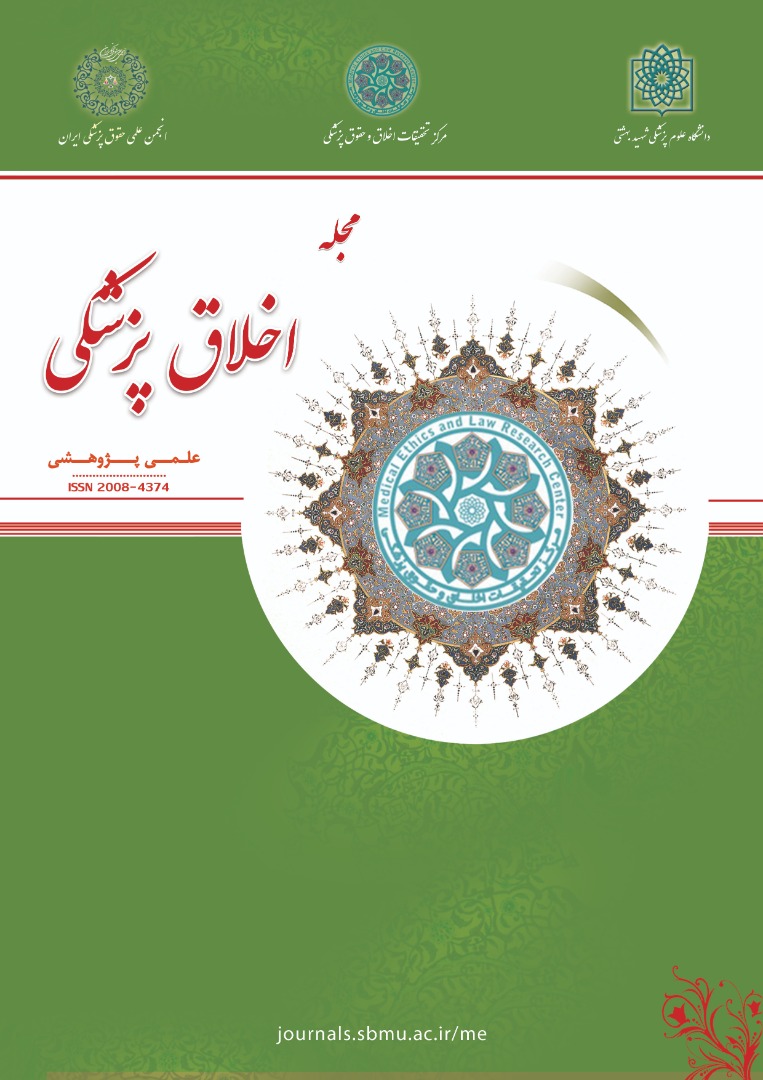ارتباط بین دیسترس اخلاقی و تعلق کاری پرستاران: یک مطالعه توصیفی ارتباطی
مجله اخلاق پزشکی - علمی پژوهشی,
دوره 7 شماره 24 (1392),
7 تیر 2013
,
صفحه 33-53
https://doi.org/10.22037/mej.v7i24.4745
چکیده
پرستاران با معضلات عملکردی در محیط کار روبرو هستندکه موجبات دیسترس را در آنها فراهم میکند دیسترس اخلاقی به عنوان نگرانی عملکردی شناخته شده است. تعلق کاری رویکردی جهت فهم بهتر تجربه کاری پرستاران است. مطالعه حاضر با هدف تعیین ارتباط بین دیسترس اخلاقی و تعلق کاری پرستاران انجام گرفت. این مطالعه مقطعی از نوع همبستگی است که پرسشنامهها در بین 184 نفر از پرستاران شاغل در بیمارستانهای شهرستان سیرجان پخش شدند. دادهها با استفاده از پرسشنامه دیسترس اخلاقی و تعلق کاری جمعآوری شد. بر اساس یافتههای این پژوهش پرستاران مورد مطالعه شدت متوسطی از دیسترس اخلاقی را تجربه میکردند و رابطه مثبت معنیدار بین فراوانی و شدت دیسترس اخلاقی وجود داشت. همینطور بین شدت دیسترس اخلاقی و تعلق کاری پرستاران ارتباط معنیدار مثبت وجود داشت (p=0.011 و R=0.188). پیشنهاد میگردد مدیران پرستاری راهکارهایی برای از عهدهبرآیی دیسترس اخلاقی توسط پرستاران در نظر بگیرند تا پرستاران ضمن برخورداری از تعلق کاری بالا، دیسترس اخلاقی کمتری را تجربه کنند.
- دیسترس اخلاقی؛ تعلق کاری؛ پرستاران
ارجاع به مقاله
مراجع
Aiken, LH. Clarke, SP. Sloane, DM. Sochalski, JA. Busse, R. Clarke, H. Giovannetti, P. Hunt, J. Rafferty, AM. Shamian, J. (2001). Nurses’ reports on hospital care in fivecountries. Health Affairs. 20 (3): 43-5.
Austin, W. Lemermeyer, G. Goldberger, L. Bergum, V. Johnson, M. (2005). Moral Distress in healthcare practice: The situation of nurses. HEC Forum. 17: 33-48.
Bakker, AB. Demerouti, E. (2008). Towards a model of work engagement. Career Development International. 13: 209-23.
Bakker, AB. Schaufeli, WB. Leiter, MP. Taris, TW. (2008). Work engagement: An emerging concept in Occupational health psychology. Work & Stress. 22 (3): 187-20.
Corley, MC. (2002). Nurse moral distress: aproposed theory and research agenda. Nurse Ethics. 9: 636-50.
Corley, MC. mininck, p. elswick, PK. Jacobs’s, M. (2005). Nurse moral distress and ethical work environment. Nurse Ethics. 12: 381-90.
Corley, MS. Elswick, RK. Gorman, M. Clor, T. (2001). Development and evaluation of a moral distress scale. Journal of Advanced Nursing. 33 (2): 250-6.
Elpern, EH. Covert, B. Kleinpell, R. (2005). Moral distress of staff nurses in a medical intensive care unit. AJM. 14: 523-30.
Erlen, JA. (2001). Moral distress: A pervasive problem. Orthopaedic Nursing. 20: 62-80.
Escriba`-Agu¨ ir, V. Martı´n-Baena, D. Pe´ rez-Hoyos, S. (2006). Psychosocial work environment and burnout among emergency medical and nursing staff. International Archives of Occupational and Environmental Health. 80: 127-33.
Fry, ST. Horey, RM. Hurley, AC. Foley, BJ. (2002). Development of a model of moral distress in military nursing. Nursing Ethics. 4: 373-87.
Georges, JJ. Grypdonck, M. (2002). Moral problems experienced by nurses when caring for terminally ill people: A literature review. Nursing Ethics. 9 (2): 155-78.
Hamric, AB. Blackhall, LJ. (2007). Nurse-physician perspectives on the care of dying patients in intensive care units: collaboration, moral distress, and ethical climate. Critical Care Medicine. 35: 422-9.
Lawarence, LA. (2009). Work engagement, moral distress’ education level, and critical reflective practice in intensive care nurses. Arizona- University of Arizona. Doctoral Tesis Nursing. 2-199.
Maiden, J. (2008). Aquantitative and qualitative inquiry into moral distress, compassion fatigue , medication error, and critical care nursing. Doctoral Tesis Nursing. USA Univesity of San Diego.
Mauno, S. kinnunen, U. Rookolainen, M. (2007). Jobdemands and resources as antecedents to work engagment: A longitudinal study. Journal of Vocational Behavior. 70: 149-71.
Merghati-Khoiee, E. Vaziri, MH. Alizadegan, SH. Motevallian, A. Razzaghi kashani, O. Goushegir, SA. (2008). Developing the Moral Distress Scale in the Population of Iranian Nurses. Iran J Psychiatry. 3: 55-8.
Nathaniel, AK. (2006). Moral reckoning in nursing. West j nurse res. 28: 416-48.
Pauly, BR. Varcoe, C. Storch, J. Newton, L. (2009). Registered Nurses’ Perceptionsof Moral Distress and Ethical Climate. Nursing Ethics. 16 (5): 561-73.
Range, LM. Rotherham, AL. (2007). Moral distress among nursing and non-nursing students. Nursing Ethics. 17 (2): 225-32.
Schaufeli, WB. Bakker, AB. (2004). Job demands, job resources and their relationship with burnout and engagement: A multi - sample study. Journal of organizational behavior. 25: 293-315.
Schaufeli, WB. Salanova, M. Gonzalez-Romá, V. Bakker, AB. (2002). The measurement of engagement and burnout: a confirmative analytic approach. Journal of Happiness Studies. 3: 71-9.
Wilkinson, JM. (1988). Moral distress in nursing practice: experience and effect. Nurse forums. 23 (1): 16-29.
Zuzelo, p. (2007). Exploring the moral distress of registered nurses. Nursing Ethics. 14 (3): 344-54.
- چکیده مشاهده شده: 556 بار
- PDF (English) دانلود شده: 307 بار
